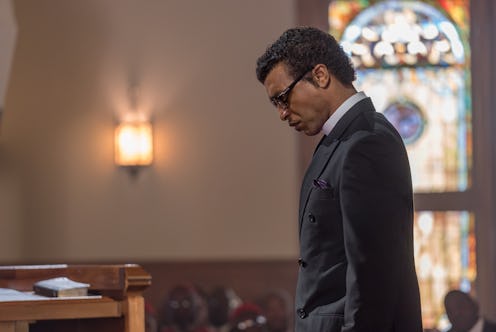Entertainment
Netflix’s 'Come Sunday' Is A True Story That Could Change The Way You Think

Netflix seems to release a new original film just about every day now, so it can be quite difficult to keep up with all of them. But one recent release that you should really familiarize yourself with is Come Sunday. The film tells the story of a popular pastor who, after believing God spoke to him, tells his congregation that there is no such place as Hell and that everyone is already saved. This leads to a revolt among his followers and peers, who brand him a heretic. It's certainly a dramatic tale, but is Come Sunday on Netflix a true story?
It is. The film is based upon the life of Bishop Carlton Pearson, portrayed in the film by Chiwetel Ejiofor, and was inspired by an episode of the NPR radio show This American Life, according to Variety. The episode, entitled "Heretics," aired in 2005 and first exposed the story of the Tulsa, Oklahoma-based Pearson to a large national audience. It was around the year 2000, according to Tulsa World, when Pearson — then the bishop of Higher Dimensions Family Church, one of the city's largest megachurches with over 5,000 members — began preaching a different interpretation of Christianity that led to his ostracization from the community by his fellow preachers soon after. This led to Pearson, who was so high-profile that he had served as a spiritual advisor to President George H.W. Bush in the '90s, losing his church, his home, and his fortune, according to an interview he gave to Megyn Kelly on the Today Show. So what did Pearson do that was so controversial, and how did he come to change his views?
In both real life and the film, Pearson came to believe in what he called the "Gospel of Inclusion" after watching a TV show about genocide in Rwanda. Previously, Pearson had believed that non-Christians were doomed to eternal damnation, consistent with the beliefs of most Pentecostal teachings. But after seeing the suffering and slaughter of the Tutsi people of Rwanda, many of whom were non-Christian, Pearson began to struggle with the idea that a just God would punish these people for all eternity after their deaths simply because they were not "saved" by a belief in Jesus Christ. He argued that Jesus' death had saved the souls of all people from that point forward, not just those who followed his teachings. Here is how Carlton describes his views toward Hell on his website:
"I am convinced the concept of eternal damnation is both absurd and obscene and vulgar, indeed a miscarriage of ethical and moral justice. I question the concept of 'eternal damnation' and torment in a presumed customized torture chamber called hell. I question how a supposed 'loving God' whose 'mercy endured forever' as scripture says, would or could sponsor such an obscene place. I could not reconcile, 'The love' of God and such a vulgar concept. Through in depth biblical and historical research and deeper self and soul reflection I discovered that our traditional concept of hell was both flawed, misinterpreted, irrelevant and against the moral character of Infinite Love."
Today, Pearson has managed to land back on his feet. His Gospel of Inclusion has been accepted by the Unitarian Church, and he currently preaches at the All Souls Unitarian Church in Tulsa. However, most of his time is spent preaching what he calls "Expanded Consciousness" and developing a worldwide network of "Metacostal" churches that preach "radically inclusive love and self-actualization" with an emphasis on bridging the gap between metaphysics and Pentecostalism.
Come Sunday is not only based on a true story, but on a very unexpected one. With so much talk lately regarding the influence of some Evangelical voters in America who promote exclusion, it's heartening to learn how one highly-influential Evangelical voice came to represent inclusion instead.